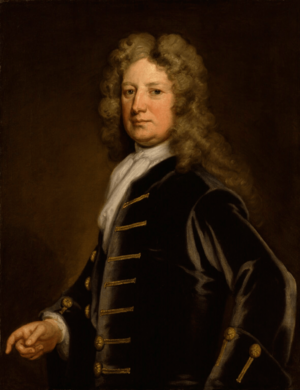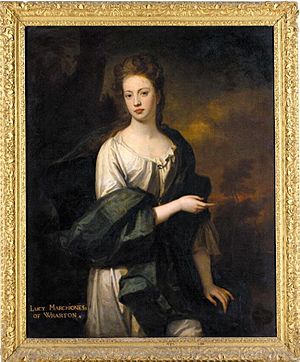Thomas Wharton, 1st Marquess of Wharton facts for kids
Quick facts for kids
The Most Honourable
The Marquess of Wharton
|
|
|---|---|

Portrait by Godfrey Kneller
|
|
| Lord Privy Seal | |
| In office 1714–1715 |
|
| Preceded by | The Earl of Dartmouth |
| Succeeded by | The Earl of Sunderland |
| Lord Lieutenant of Ireland | |
| In office 1708–1710 |
|
| Preceded by | The Earl of Pembroke |
| Succeeded by | The Duke of Ormonde |
| Personal details | |
| Born | August 1648 |
| Died | 12 April 1715 (aged 66) |
Thomas Wharton, 1st Marquess of Wharton (born August 1648 – died 12 April 1715) was an important English politician. He was a member of the Whig political party. He was known for his political skills and charming personality.
Contents
Who Was Thomas Wharton?
Thomas Wharton was the son of Philip Wharton, 4th Baron Wharton. His mother was Jane Goodwin. Jane was the only daughter of Colonel Arthur Goodwin. She inherited many lands in Buckinghamshire, England. These lands included places like Winchendon and Wooburn.
Thomas Wharton's Political Journey
Thomas Wharton had a long career in politics. He was a Member of Parliament for 17 years. A Member of Parliament is someone elected to represent people in the country's law-making body.
Standing Against King James II
Wharton led the Whig group against King James II. The Whigs were a political party that wanted more power for Parliament. They did not want the king to have all the power. This disagreement helped create the two-party political system we see today. Before a big event called the Glorious Revolution, Wharton worked with army officers who were planning against King James.
Working with King William III
In 1689, King William III made Wharton a member of the Privy Council. This was a group of advisors to the King. He also became the Comptroller of the Household. This job managed the royal household's money. This was one of the first times a royal position was directly linked to the government.
Serving Under Queen Anne
Wharton left his government job in 1702. This happened when Queen Anne became queen. She did not like him very much. But in 1706, he was given new important titles. He became the Earl of Wharton and Viscount Winchendon.
From 1708 to 1710, he served as the Lord Lieutenant of Ireland. This was a very important role, like a governor for Ireland. He was replaced by a different politician when a new government took power.
Later Political Actions
In 1711, Wharton supported a motion called "No Peace Without Spain." This meant he believed England should not make peace until Spain was fully dealt with in the ongoing war. The next year, he spoke out against the government. They had created twelve new noble titles to help pass a peace agreement.
Thomas Wharton's Final Years
When George I of Great Britain became king, Wharton became important again. In January 1715, he received more new titles. He became the Marquess of Catherlough and Earl of Rathfarnham in Ireland. In February 1715, he became the Marquess of Wharton in Great Britain.
He passed away suddenly in April 1715. He was buried in Upper Winchendon, Buckinghamshire. Thomas Wharton also wrote the words for a famous song called Lillibullero. People said this song helped make King James leave England.
Thomas Wharton's Family Life
Thomas Wharton married twice. His first wife was Anne Lee. She was also known as Nan. She was a poet and writer. They did not have any children together.
His second wife was Lucy Loftus. She was the only daughter of Adam Loftus, 1st Viscount Lisburne. Thomas and Lucy had one son, Philip Wharton, 1st Duke of Wharton. They also had two daughters, Lucy and Jane. When his son Philip died without children, most of Thomas Wharton's titles ended. Only the Barony title passed to his daughter Jane.
See also
 | William L. Dawson |
 | W. E. B. Du Bois |
 | Harry Belafonte |


